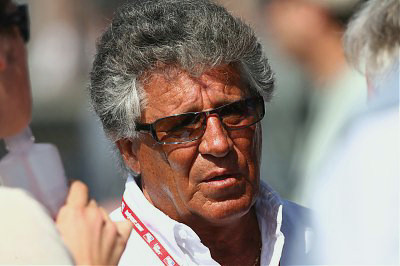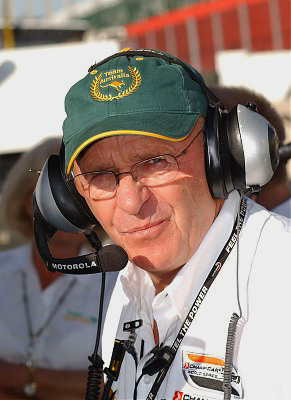The Way It Is/ American open-wheel racing desperately needs inspired leadership
by Gordon Kirby Formula One's great industrial espionage story, unfolding as we speak between the sport's two most accomplished and admired teams, Ferrari and McLaren, has put every other motorsports story of the year in the shade. Even Dale Earnhardt Jr's much-anticipated new look and branding adventure for 2008 with Rick Hendrick's team is small beans in comparison.
Formula One's great industrial espionage story, unfolding as we speak between the sport's two most accomplished and admired teams, Ferrari and McLaren, has put every other motorsports story of the year in the shade. Even Dale Earnhardt Jr's much-anticipated new look and branding adventure for 2008 with Rick Hendrick's team is small beans in comparison.
At this point, I cannot offer any additional useful information or perspective on the Ferrari/McLaren affair. For sure, it is F1 at its most greedy, arrogant and self-indulgent with the too-clever-by-half syndrome taken to extreme proportions. That attitude has been the making of Bernie Ecclestone and Max Mosely's massively succeesful modern Formula 1 carnival show and this latest episode has and will take it to new heights. The Ferrari/McLaren imbroglio is sure to run and run, even as the two teams continue to fight it out pretty much on their own on the track.
As fantastical and truly Formula 1-ish as all this is, I have to say it would be wonderful if American open-wheel racing enjoyed even the smallest whiff of this kind of intrigue--something to propel the sport onto the front pages and get the tongues wagging of sports fans around the world. But sadly, there's little likelihood of that happening, particularly after Mario Andretti confirmed to my colleague John Oreovicz a few days ago that his latest effort in a long line of attempts to get Tony George and Kevin Kalkhoven to sit down and hammer out an agreement has come to nothing yet again.
This latest round of talks happened a few weeks following Mario's continuing personal mission to heal the deep wounds created by the twelve-year old CART/IRL civil war. Nobody has worked harder in recent to bring the two factions together. In fact, Andretti has been the one man constantly trying to compel Tony George and Kevin Kalkhoven to sit together at the negotiating table and begin to heal the most damaging political war in the history of modern sport.
"I almost cried," Andretti told Oreovicz. "I had a situation put together where a really comprehensive meeting was set to take place and it got derailed.

© LAT USA
"That's what I fight all the time when I'm reasoning with them," he continued. "I'm like a broken record trying to make the point. Then they say they agree, but when it comes down to trying to negotiate through a little bit of give and take, some of the major issues are pulled off the table.
"I got them to the altar more than once - I just can't get them to say 'I do."
Over many years Mario has provided more leadership for American open-wheel racing than anyone else, first by representing the sport ahead of any other person and giving it character and identity, but also by using his presence and personality to force the warring factions to talk to each other. Twenty years ago Andretti sat on CART's board of directors as the drivers' representative and was very effective. But he tired of the political debate and wanted to focus on his driving as he approached his fiftieth birthday and after he quit the organization was never as healthy.
Indeed, the essential element that's always been lacking from American open-wheel and sports car racing is leadership. There's never been one iota of it. Instead, we've witnessed power struggle after power struggle with no pre-eminent personality emerging from the soup like Bill France Sr. and Jr. in NASCAR and Bernie Ecclestone in F1.
Team owner Derrick Walker--winner of Sunday's Toronto Grand Prix with Will Power driving--is among many leading lights in the Champ Car paddock who wonder where the leadership ever will come from and what the organization's plan is to rebuild itself, particularly as unification with the IRL looks as much as a chimera as ever.
"I've been around a long time and seen a lot of dynasties come and go," Walker remarked. "When I look at the short history of the current Champ Car dynasty--the Kalkhoven-Forsythe-Pettit-Gentilozzi era--I was really happy that they came in with the enthusiasm they had and saved us from going to the wrecking yard. The dynasty we have now saved and stabilized the series and got us into new equipment. They did a lot of positive things. We've got some great events and we're spreading our tentacles but I think we need a new plan.
"Champ Car is one of the most underrated, little-known properties in racing. It's a real gem with a great formula and balance of racing and has been for many years, and it's sad to see it drop from where it needs to be. To me, Champ Car needs a new plan. It needs some revitalization. We need to know what the plan is and we need to be shouting it from the treetops."
Added Walker: "Most people don't ask, 'Where is Champ Car going?' The most asked question is, 'When are you going back to the Indy 500?' And for those of us in the Champ Car series who love the series, that's probably the worst-case scenario. We would love to go back to Indy, but that idea seems to be long-gone and Champ Car needs to get on with the future.

© LAT USA
To begin with, there's no doubt that Champ Car desperately needs a stronger, more regular slate of races in the United States, rather than vanishing for months at a time as it does this year. After three races in a row to begin the year followed by a seven-week break there were two races in Portland and Cleveland before the series moved to Canada for three races. Then comes San Jose and Elkhart Lake in August after which the series leaves the country for three and half months before the season-closer on a new Phoenix street circuit in December.
If Champ Car wants to rebuild its identity and brand and build any kind of serious fan and media following in the USA this critical issue of building a proper platform of American races must be seriously addressed. But at this point there appear to be few chances of more American races bolstering the Champ Car schedule. In fact, it's likely Champ Car will take two trips to Europe in '08 for a total of four races, an idea that doesn't appeal to many of the teams.
"Overseas races make money for the series owners, but lose money for the teams," Newman/Haas's general manager Bran Lisles explained. "Champ Car is paid a lot of money for those races, but they are expensive for us to do and they don't bring us any sponsorship. Our sponsors are American divisions of companies, not international divisions, and when we have an overseas races the international or regional division gets the credit for the exposure, not the American division that's paying the bills. So it's a loser for us, all-round."
CART has been through this debate about international races and sponsorships many times. In fact, it's one of the issues that led to CART's disintegration so it's a bit disturbing to see the matter again raising its head.
Another almost intractable issue facing both Champ Car and IRL is how to attract more regular print and major media coverage. So much of it has drained away over the years that the press rooms at the races are almost ghost towns. The fact is, in terms of column inches and media recognition, American open-wheel racing is among the smallest, if not the smallest sport in the nation, witness the sad TV ratings.
The IRL races are staffed and covered by the Indianapolis Star but there are no newspapers who assign a man to cover anything like the majority of the Champ Car races. The only regulars covering Champ Car are David Malsher of Autosport and David Phillips with Racer and Speed.
Over CART's twenty-five years I covered more than 400 CART races for Autosport, Autoweek, OnTrack, Indy Car and Racer and many other magazines around the world. For quite a few years I wrote a couple of pages every month about CART in Road & Track, but all that is long-gone. The interest in open-wheel racing from the magazine world has vanished.
I can also tell you that trying to publish books in the United States about open-wheel racing or drivers is well-nigh impossible. Last year a book I wrote about the Unsers back in 1988, titled Unser, an American Family Portrait, was re-published without any business agreement with me and at a minimum print run of 2,000. Since then fewer than three hundred of these re-published books have been sold and the book has been remaindered by the publisher who recently offered books to me at ten cents on the dollar!
I apologize for telling such a sad and shabby little story, but it deserves to be put on the record. When a book about a legendary American open-wheel racing family is produced in such compromised circumstances and has so little sales power, it's fair to say the sport is in deep trouble.
Indeed, the biggest sponsorships in Champ Car these days are less than a tenth of what they were ten years ago and that's because of the miserable shortage of media coverage.
So again, it's all about leadership, or the lack thereoff. If some serious example of it doesn't emerge very soon in some very clear form American open-wheel racing will continue slouching its way along a road to nowhere.
Auto Racing ~ Gordon Kirby
Copyright 2007 ~ All Rights Reserved
Copyright 2007 ~ All Rights Reserved
Top of Page